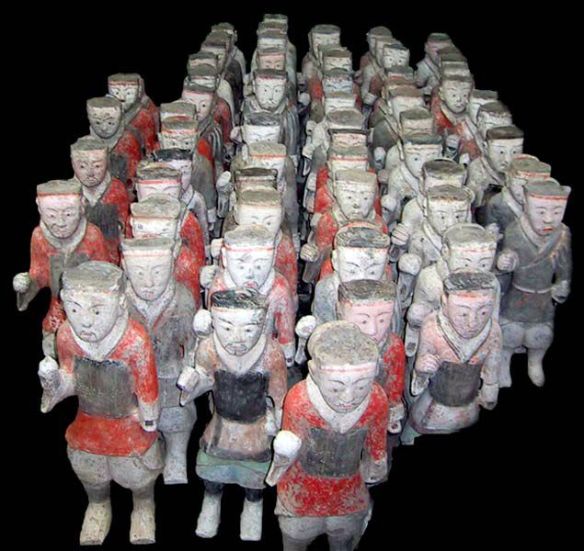
Painted pottery figurines of lightly armoured Western Han infantrymen burial objects from a 2nd-century BC tomb near Xian. These are representative of the mass infantry armies of Han China.
Liu Bang pursued Xiong Yu eastwards across the North China Plain to Gaixia, where the Chu army was trapped by the convergence of three other Han forces
Date: 203 BC Location: near modern Guzhen, Anhui province, China
He called his enterprise that of a Hegemon King, intending to manage the world by means of mighty campaigns. After five years, he finally lost his state and died himself fat Tung-ch’eng [Dongcheng],yet even then he did not come to his senses and blame himself. What error! (ABOUT X IANG Yu) SIMA Q IAN, THEGRANOSCRIBE’SRECOROS, C. 100BC
The battle of Gaixia was the final engagement of the protracted struggle between the rival generals Liu Bang and Xiang Yu for dominance over China, following the collapse of the short-lived Qin dynasty. This encounter marked one of the most significant turning points in Chinese history, when disunity and internal strife gave way to a lasting imperial order.
The contenders
Soon after the death of the First Emperor in 210 BC, the harsh rule of the Qin dynasty was challenged by a series of rebellions. Two men eventually emerged as preeminent among the rebel leaders. The fierce and impetuous Xiang Yu, scion of a line of hereditary generals in the Yangzi valley kingdom of Chu, commanded the most powerful military force and the allegiance of most of the other leaders. But it was the wily Liu Bang, a former Qin functionary of humble birth, whose troops had captured the Qin capital Xianyang (near today’s Xian). Xiang Yu assigned kingdoms to eighteen of the rebel leaders, reserving for himself a position as first among equals with the title Hegemon King of Western Chu. He compelled Liu Bang to evacuate the capital region and move his forces southward into the Han River valley where he would assume the title of King of Han. A few months later, in the summer of 206 BC, Liu Bang took advantage of Xiang Yu’s distract ion elsewhere to reoccupy the territory around Xianyang, precipitating the war between Chu and Han.
The Chu- Han struggle
After securing the highland region around Xianyang, Liu Bang moved east to contest Xiang Yu’s rule over the North China Plain. For two and a half years, the two sides battled for control of a series of fortified posit ions at Xingyang, Chenggao and Gongxian, just south of the Yellow River in today’s Henan province. While Xiang Yu focused on attacking these Han posit ions frontally with his superior forces, Liu Bang sent his best general, Han Xin, to defeat the Hegemon King’s allies north of the Yellow River, suborned another key Chu ally in the Yangzi valley, and set his own ally Peng Yue to work harassing the supply lines that stretched eastward to Xiang Yu’s home base in the modern provinces of Jiangsu and Anhui. By the autumn of 203 BC, the success of this multi-pronged strategy had left Xiang Yu’s main army weakened, dispirited and short of provisions. At this point Xiang Yu reached an agreement to divide the empire with his rival, and withdrew eastward towards his capital at Pengcheng.
The final battle
Liu Bang’s advisors now persuaded him to break the agreement and set out in pursuit of the Chu army. Overtaken at Guling, Xiang Yu struck at his pursuers and threw them on the defensive. As armies led by Han Xin, Peng Yue and other Han allies converged on the area, however, the odds against Xiang Yu became overwhelming and his army was encircled at the town of Gaixia, about 32 km (20 miles) east of today’s Guzhen, Anhui. There he gave battle with 100,000 men against a combined Han force of 300,000.
The Han army deployed in three echelons, with Han Xin commanding from the centre of the first echelon. The Han general’s opening thrust was repulsed, but the Chu counter-attack was stalled by the divisions on his left and right flanks, giving him the opportunity to return to the offensive and defeat the Chu army. Surrounded in his camp at Gaixia and hearing the sound of Chu songs from the Han lines, Xiang Yu believed that his entire kingdom had been overrun. In despair, he broke out of the encirclement with an escort of 800 horsemen and fled southwards, but was soon brought to bay near the north bank of the Yangzi River. There he slit his own throat.
Consequences
The elimination of Xiang Yu cleared the way for Liu Bang to take the imperial throne and establish the Han dynasty. Where Xiang Yu had favoured a loose confederation of autonomous regional kingdoms, Liu Bang and his heirs laboured to construct a more centralized imperial state. The dynasty they created did not fall until AD220, and the imperial system of government in China survived until AD1912.